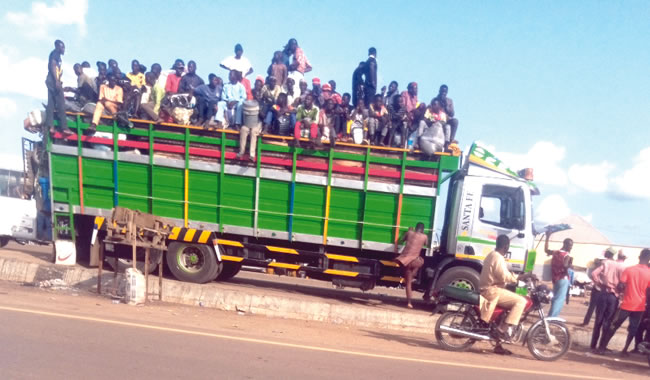CLEMENT IDOKO observes that 20 years after the enactment of the Child Rights Act (2003), Nigeria is still grappling with the issues of child labour and out-of-school children syndrome, concluding that state governments must necessarily implement the provisions of the Child Rights Law they have enacted to safeguard the future of the Nigerian child.
The voices of underprivileged children on the streets of Nigeria, who are struggling for survival, have become more strident than ever as they continue to face the vicissitudes and vagaries of daily life. Such children are seen in every part of the country, especially in urban areas and on the streets during school hours.
While some of them are engaged in menial jobs and domestic servitude, others are street beggars. Some are garbage collectors, while several others are subjected to different forms of exploitative labour in violation of the Child Rights Acts which was enacted by the Nigerian government about 20 years ago.
Some of these disadvantaged children in the streets are now crying for help, calling on President Bola Tinubu to come to their rescue. They told Nigerian Tribune that they were hopeful and anxiously awaiting the current administration of President Tinubu to come up with policies and programmes that would take them off the streets to classrooms where they can realise their dreams and God-given potentials.
“We await President Tinubu to take us out of streets to classrooms; we want to go to school, but we have no means”. These were words from Ibrahim Abubakar. He is a 12-year-old and a garbage collector, popularly known as ‘baban bola’ on the streets. Nigerian Tribune met him looking scruffy recently at Sabon Gari area of Kano.
He told Nigerian Tribune that he was in Kano without his parents. To eke out a living, he has to indulge in garbage collection and picking out scrap metal and waste materials from dumpsites to sell for recycling purposes. He said he has been doing this since he was seven years old, having escaped with some neighbours from Adamawa State when their village was attacked by insurgents.
Speaking through the help of an interpreter since he could not speak English, he said he was doing this to survive and that he was hopeful that if there is the opportunity, he would go to school up to the university level.
When asked why he was on the street carrying refuse when he was supposed to be in school learning, Ibrahim said, “My parents are not here in Kano. I’m from Adamawa. I carry the garbage from some homes and shops, and they pay me money. That’s what I’m surviving on.
On his expectations from the new president of Nigeria, Abubakar said, “I want him to take us away from the streets to classrooms. We want to wear uniforms and go to school every day like other children, but we have no means. I’m not doing this alone, as you can see, there are many of us.”
On what he wants to be in the future, Abubakar, smiling, said, “I want to be a doctor.”
Apart from looking unkept, there was a bad smell oozing from the decomposing garbage he was pushing in a fabricated cart. Ibrahim was not wearing any facemask or gloves to protect him from contracting diseases. It was a wonder how he was able to cope with the odour coming from the waste he was pushing.
Ibrahim is not alone in this. According to the report of the 2018 National Personnel Audit conducted by the Universal Basic Education Commission (UBEC) in both public and private basic education institutions, Nigeria has a total of 10.2 million children who are out of school. Most of these children are roaming the street as scavengers, beggars, hawkers, and some of them are recruited for crime.
Young children who are scavengers are often seen rummaging with their bare hands through heaps of decomposing waste at dumpsites or trucks in cities across the country in search of recyclable materials, thereby making themselves susceptible to diseases such as cholera, malaria, dengue fever, respiratory infection and asthma. These are major health problems associated with improper municipal solid waste management. Experts have also warned that these diseases could spread to communities.
Aliyu Ahmed, a 14-year-old Almajiri in Kano, said he scavenges in the morning and goes to Islamic school at noon. He appealed to President Tinubu to pay attention to the plight and suffering of the underprivileged children who are on the streets like him trying to survive. He said he was not aware of the health hazards of exposure to refuse as he rummages for recyclable materials.
It is worthy to note that Kano State had just enacted the Child Rights Law in the twilight of the last administration of Governor Umar Ganduje. However, a state like Nasarawa that has enacted the law about 18 years ago, alongside some other states in Nigeria, is not implementing the provisions of the law. Nasarawa enacted the law in 2005, yet it is known for its high rate of child abuse.
On the streets of Lafia and some other urban parts of the state, indigent mothers are seen using their children as tools for begging. In traffic, they compel their children to meet drivers and passengers in vehicles to beg for alms. Children are also used as hawkers to augment family income instead of being in the school.
Accordingly, a non-governmental organisation in Nasarawa State, the Centre For Women, Youth and Community Action (NACWYCA), has made a passionate appeal to the state government to commence the implementation of the Child Rights Law which was enacted about 18 years ago.
Executive Director of the NGO, Nawani Aboki, said the implementation of the law would mitigate the high rate of abuse and violation of children in the state.
“To mitigate the impact of these neglect, abuses and violations on children, in 2003, the government passed the instrument called the Child Rights Act, which was later domesticated by several states, including Nasarawa state in 2005,” Aboki noted.
He, however, explained that the growing spate of child abuse in the state and the country at large is worrisome; hence, the need to speed up implementation.
Beside the engagement of children in hawking, begging and other forms of child abuse, some of these children are engaged in mining where they break stones at quarry sites at the detriment of their education.
Recently, such children used in farm work were seen being moved from the Federal Capital Territory Abuja in a lorry-load and headed for some states in the Northern part of the country.
According to International Labour Organisation (ILO), no fewer than 15 million children are engaged in child labour in Nigeria. The ILO describes child labour as work that deprives children (any person under 18) of their childhood, potential, and dignity, which is harmful to their physical and/or mental development.
“In Nigeria, not less than 15 million children are engaged in child labour, and half of this number is bearing the heavy burden of hazardous work,” Vanessa Phala, country director of ILO (Nigeria) said.
To address the multifaceted challenges faced by children in the country, in 2003, exactly 20 years ago, Nigeria principally enacted the Child Rights Act (2003) into law in order to implement the principles enshrined in the Convention on the Rights of the Child and the African Union (AU) Charter on the Rights and Welfare of the Child in the country.
While the Child Rights Convention (CRC) was adopted in 1989, the African Union (AU) Charter on the Rights and Welfare of the Child was adopted in 1990. Nigeria ratified the CRC in 1991 while AU Charter was ratified in 2001 with the aim of domesticating the convention and implementing the principles.
The Child Rights Act entrenches the following fundamental rights for the child, namely: rights to dignity, to leisure recreation and cultural activities, to health and health services, to parental care, protection and maintenance, to free compulsory and universal primary education, to special protection measures and protection from harm, among others.
Nigerian Tribune found that 35 state governments have already enacted the Child Rights Law in their respective states. It was gathered that only Bauchi State is yet to pass the law while the Federal Capital Territory (FCT) is operating under the Child Rights Act 2003 enacted at the federal level.
What stakeholders are asking, however, is what has changed since the domestication of CRC and subsequent enactment of the Child Rights Act in Nigeria, with more than 10.2 million children who are not in school, with the majority of them being engaged in exploitative child labour.
Worried by the development, the United Nations Children’s Fund (UNICEF) in collaboration with the Child Rights and Information Bureau, Federal Ministry of Information, organised a two-day media dialogue in Kano State on the new country programme 2023-2027 and the status of implementation of the Child Rights Law 2003 in the states of the federation.
Experts at the media dialogue advocated the implementation of the Child Rights Law in the states, as this was critical to reducing the number of out-of-school children in the country.
The Child’s Protection Specialist of UNICEF Office in Kano, Hajia Fatimah Adamu, noted that since 2022, there have been several efforts to reduce the number of out-of-school children, but a lot of reasons were responsible for the high number. She added that the Child Rights Law (CRL) was put in place to protect all kinds of children, stressing that if implemented appropriately, it would lead to the end of the menace of out-of-school children in the country.
Recall that in 2022, a UNESCO report showed that approximately 20 million Nigerian children of its approximately 200 million population are out-of-school.
Adam said: “Issues of conflict/crisis of bandits’ attacks on communities leading to people not being able to go back to their communities, and the distance to cover when going to school are responsible.
“The CRL is to protect all kinds of children, and this must be implemented by states. A lot of programmes like teacher recruitment and the provision of second chances for education for older children must be put in place. In other words, for effective implementation of the CRL, there should be massive investment in education to take children off the streets,” she said.
Adamu also called for the establishment of more family courts in the states to tackle child rights issues in the country, stressing that prioritising family courts as a structure for the implementation of child’s rights must be put on the front burner by states.
“Structures like family court should be there so that when a child commits a crime, you don’t put such a child with terrorists,” she added.
Adamu, who revealed that 35 states and the FCT had adopted the CRL, said a state like Bauchi had yet to adopt it.
Mr Temitoye Falayi, who spoke on behalf of Child Rights Information Bureau (CRIB), said the new country programmme documents would focus on key areas where the government of Nigeria requires UNICEF support, knowledge and finance.
Falayi highlighted the key areas to include health and nutrition, basic education, social policy, advocacy, WASH, HIV/AIDS and child protection.
“The new country programme contains the fundamental paradigm shift from service delivery to upstream work of contributing to building of an evidence based data collection, analysis and its use for children and women in support of more equitable social policies and programmes.”
UNICEF Communications Specialist, Geoffrey Njoku, said the media dialogue was organised to reassess the child rights implementation and results in the last five years (2018-2022) while the new Country Programme for Nigeria covers a period of five years, 2023-2027, with the target of ensuring that 10 million children have access to formal or non-formal education.
Njoku said the Fund also targets providing 4.8 million children with access to learning materials and assisting 21 states to scale up foundational literacy and numeracy.
He explained that the new programme was approved following the conclusion of UNICEF’s 2018-2022 programme in which millions of children were provided access to basic education and 58 million were vaccinated against polio through its Zero-Dose Strategy, covering 100 local government areas and reaching underserved children in 18 states.
Njoku said 30 million children were vaccinated against life-threatening diseases in the last five years, while 23 million children also received two doses of Vitamin A in 2022.
Speaking further on the major contributions of the concluded programme, he said 7.4 million children under the age of five today have birth registration, adding that 35 states have enacted the Child Rights Law.
According to him, 2.8 million children living in conflict affected areas received psychosocial support through the programme, while 25 million children were covered in the National Social Register and 20 million people were now living in certified free of open defecation communities, among other contributions.
On the new programme, Njoku said the vision of UNICEF is to “ensure the rights of every child in Nigeria, especially the most excluded, to survive, thrive, learn, be protected, and develop to his or her full potential, free from poverty, in a safe and sustainable climate and environment.”
On the health priorities of UNICEF in the programme, he said it targets having over one million additional children immunised, 15,000 additional community health workers trained, and ensuring that over 1,700 primary health care facilities, out of 3,476, in 14 states meet PHC minimum standards.
Njoku further stated that the programme will ensure that 25 health facilities have functional newborn units and state-level and national capacities built to prepare for and respond to public health emergencies.
He said on water, sanitation and hygiene (WASH), the Fund is targeting to ensure that five million people have access to basic sanitation services and two million people have access to basic water supply services and 500 schools and 250 primary health cares, PHCs, have access to basic WASH services.
The Executive Director, Education Rights Initiative (ERI), Dr Solomon Udah, also noted that the right to dignity, to leisure recreation and cultural activities, to health and health services, to parental care, protection and maintenance, to free compulsory and universal primary education, to special protection from harm, have been expressly stated in the Child Rights Act which Nigeria signed into law in 2003..
He maintained that to effectively deal with the issues of child labour, out-of-school children syndrome in Nigeria, and other forms of child abuse in the country, the Child Rights Act must be implemented, saying it requires more than merely having the law in a state.
“It is unfortunate that in Nigeria, laws are not implemented and in most cases, where they are implemented, they are skewed against the children, poor and the vulnerable. Even in the 1999 Constitution of the Federal Republic of Nigeria, there are provisions to protect and safeguard the lives of children in Nigeria, including the right to compulsory primary education as emphasised by the Universal Basic Education (UBE) Act 2004.
“Across the streets of Nigeria, not only in the North, you will see school age children hawking during school hours. Some of them are turned into beggars by their parents, who are supposed to protect and cater for them. We have them here, even in Abuja. People should be held responsible for violations of children’s rights. Parents should be punished or serve some sentences for refusing to put their children in school. Education is a child’s right,” Udah said.
He revealed that Section 28 of the Child Rights Act made ample provision for protection of the child’s rights against exploitative child labour. The penalty is also spelt out as the person is liable on conviction to a fine not exceeding N50,000 or five years imprisonment or both, if it is a body corporate N250,000.
Section 30 of the Act listed offences such as sexual abuse, unlawful sexual intercourse, and other forms of exploitation, with the person liable on conviction to a fine of N500,000 or imprisonment for five years, or both.
READ ALSO FROM NIGERIAN TRIBUNE
WATCH TOP VIDEOS FROM NIGERIAN TRIBUNE TV
- Let’s Talk About SELF-AWARENESS
- Is Your Confidence Mistaken for Pride? Let’s talk about it
- Is Etiquette About Perfection…Or Just Not Being Rude?
- Top Psychologist Reveal 3 Signs You’re Struggling With Imposter Syndrome
- Do You Pick Up Work-Related Calls at Midnight or Never? Let’s Talk About Boundaries






